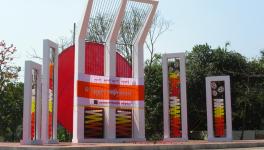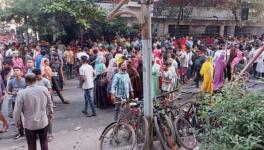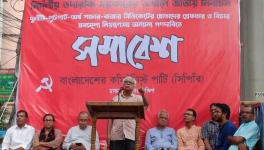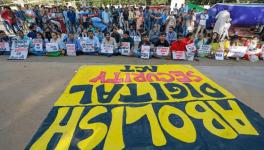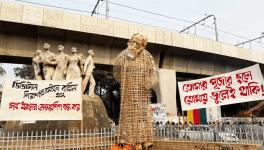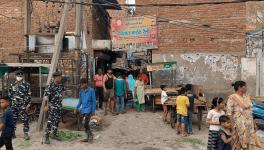Dhaka: Students and Youth Protest During Mangal Shovajatra, Bangladesh's New Year Event
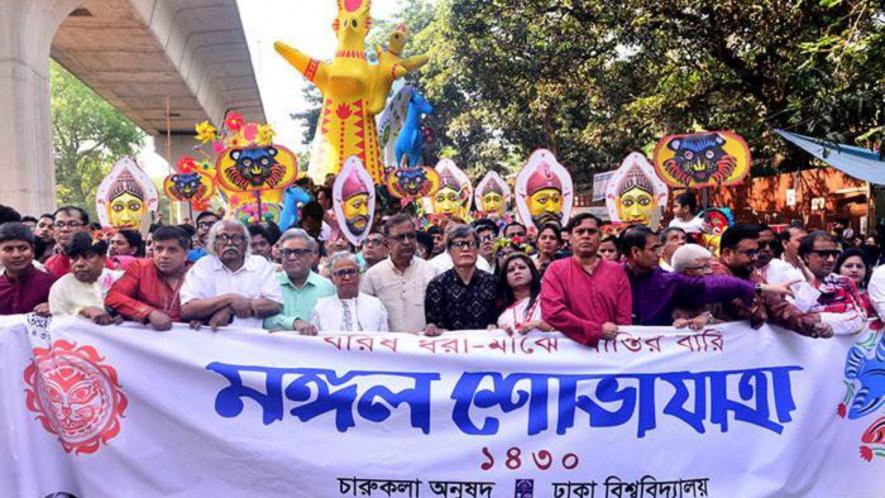
Dhaka: With the wish to spread harmony among all and Rabindranath Tagore's song 'Barisho dhora Majhe Shantir Bari' as the theme, the Bengali New Year's procession was held at Dhaka University in Bangladesh.
On Friday (April 14), the Mangal Shovajatra was taken out from the Fine Arts Faculty of Dhaka University at nine in the morning. The procession ended at the Shahbagh junction and returned to the campus.
Participants held placards with various demands, including the repeal of Bangladesh's current digital security law, control of the market's rising commodity prices, protection of democracy and free speech, and an end to extrajudicial killings. They also held portraits of tapa puppets, fish, and birds from traditional Bengali culture.

Fahim Ahmed Chowdhury, general secretary of the Democratic Student Council, one of the alliance partners of the student union, said that the Mangal procession started as part of the cultural protest against the former dictator Hussain Muhammad Ershad.
"The dictatorial Ershad government fell 30 years ago. But the country is still not free from autocracy. A new fascist regime is upon us. We have been raising the issue of people's rights since the march to the present day as part of the cultural protest against the fascist regime."
At around 11 am, the participants held a public signature collection programme in front of Dhaka University's Raju sculpture, demanding the repeal of the Digital Security Act. At that time, there was an incident of blocking the program by the proctorial team of the university.
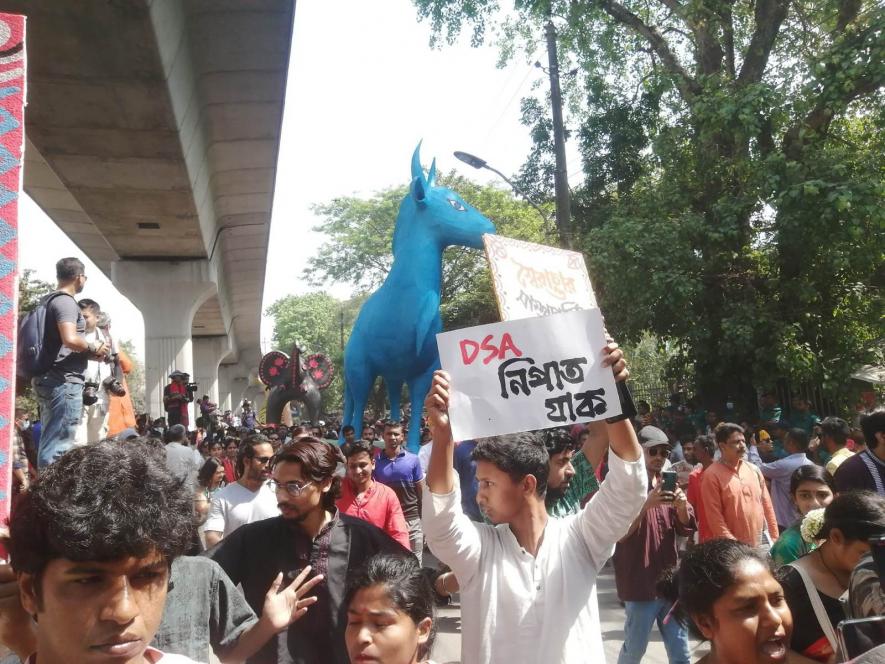
The Democratic Student Alliance issued a press statement strongly condemning these incidents.
In a statement, the leaders of the student union said that if they participate in the procession held on the day of Bangla to wish the country and the people, cancel the Digital Security Act (DSA), stop extrajudicial killings, cut prices, save people, and save lives, the organiser is concerned while the procession is underway.
They said the procession came into Bengali national life as a protest culture. During the height of the anti-dictatorship movement, the student population adopted the New Year's celebration as a tool of protest against autocratic fundamentalism.

But during the Awami Fascist era, there was a conspiracy to remove the New Year and the procession from their original spirit and make them a mere arrangement. In continuation of this, the manifestation of the terrible fascist culture of suppressing all dissent is reflected in the horrible incidents like blocking the spontaneous participation in the March procession.
"Awami supporters among the government party leaders and organisers of the procession cannot tolerate the opposition to the digital security law, the criticism of the increase in the price of goods, and the demand to stop extrajudicial killings. It is also clearly against the democratic culture of the Mangal procession."
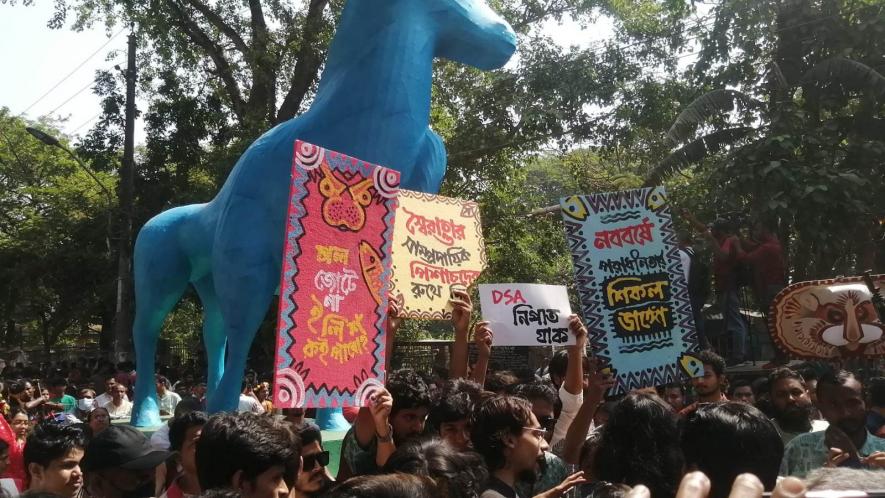
The coalition's leaders recently expressed their concerns regarding the impact of the Awami government's long-standing rule, which they called fascist. The coalition pointed out that the rising commodity prices have caused widespread suffering amongst the public. At the same time, the Digital Security Act (DSA) and other oppressive laws are being used to prevent people from speaking out and exercising their democratic rights.
In the 1980s, a joyful procession emerged from the fine arts faculty of Dhaka University on the first day of Boishakh, calling for an end to military rule. This procession, later named 'Mangal Shovaajatra', has continued to take place annually on the first day of Baisakh for over three decades, thanks to the efforts of art teachers and students. In 2016, UNESCO recognised the Mangal Shovajatra as a cultural heritage. The procession is viewed as a combination of the non-communal Bengali tradition spanning thousands of years, making it a significant cultural event in Bangladesh.
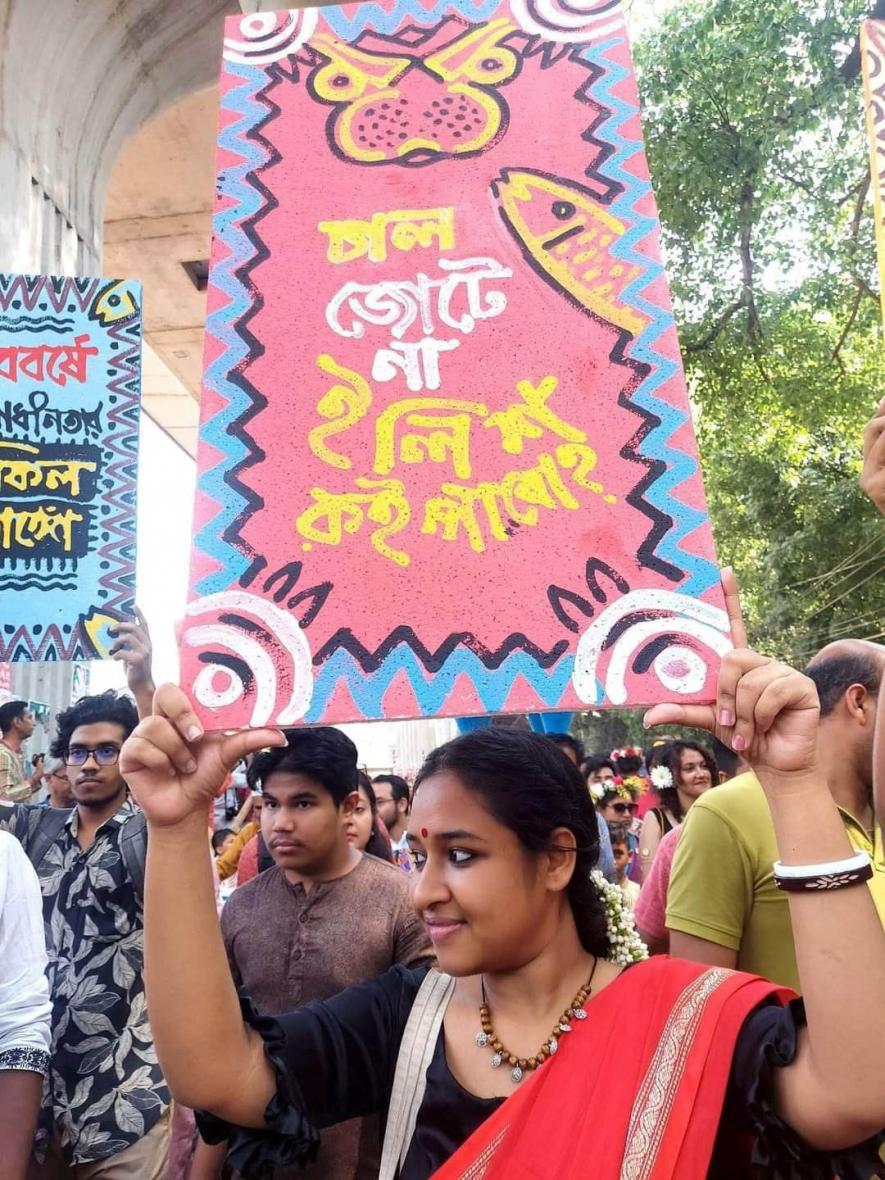
In light of the current traditions of Bangladesh, there were various elements of folk culture, including masks, puppets, fish, and bird portraits, in this procession. It also had structures of peacocks, nilgai, sheep, tigers, elephants, and tapaputu (mother and child) made of bamboo and paper.
Shimul Kumbhakar, a student in the fine arts and sculpture department who is associated with the organisation of this year's Mangal Shovajatra, told the media that the theme of this year's Shovajatra is 'Catching the Rain: The Rain of Peace,' giving the message of building a peaceful world instead of war.
Various structures have been constructed for the procession following the theme.
Participating in the procession, the State Minister for Culture of the Government of Bangladesh, KM Khalid, said that Bengali New Year 1430 has a message of hope and success.
"Mangal processions are our cultural heritage. It is listed in the UNESCO Heritage. Our freedom struggle started through cultural movements."

Dhaka University Vice-Chancellor Prof. Md Akhtaruzzaman said, "Mangal Shovajatra is a cultural tradition of Bangladesh. Now it belongs to the world memory of heritage. As a result, this cultural heritage belongs to the international community. It is a great resource for everyone in the world. It is now the collective responsibility of all to maintain, preserve, and spread it among all. The message of building a non-communal and humane Bangladesh is always given through it. All the people spontaneously participated in protesting the panic that was there. It is a humanitarian and non-sectarian call against all extremism and sectarianism."
On March 19, artist Rafiqun Nabi inaugurated the preparation phase of the procession by painting a kingfisher bird. Then, the students made various masks, dances, and paintings over several months. All these artworks are sold next to the Zainul Gallery. Although the government is involved in the organisation, the students wanted to create their own artwork. The cost of the procession is borne by selling these artworks. This time, students of the 24th batch of fine arts led the procession.
Get the latest reports & analysis with people's perspective on Protests, movements & deep analytical videos, discussions of the current affairs in your Telegram app. Subscribe to NewsClick's Telegram channel & get Real-Time updates on stories, as they get published on our website.









